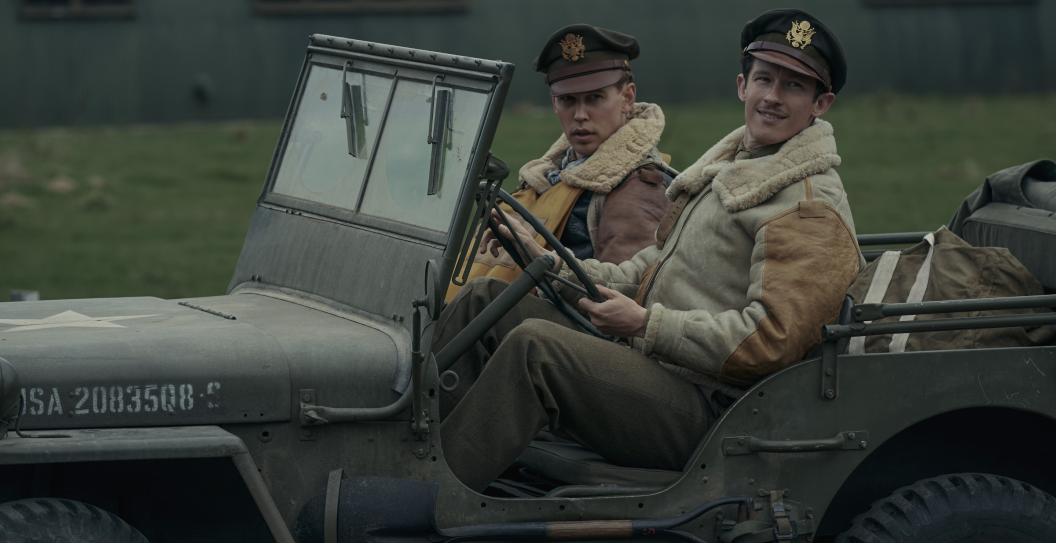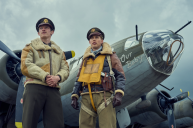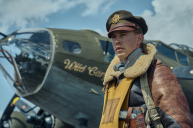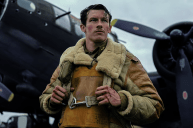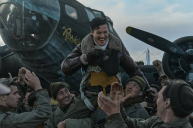Warning, spoilers ahead for episodes 1 and 2 of 'Masters of the Air.'
Like a payload from a Flying Fortress bomber squadron, Apple TV+ dropped an explosive two-episode premiere of its highly-anticipated WWII drama "Masters of the Air" that starts shelling you from the get-go and doesn't let up.
We open with a brief respite before the fire starts: our two main heroes, best friends Major Gale Cleven (Austin Butler) and Major John Egan (Callum Turner), chumming it up at a bar stateside. The two pals' personalities complement each other well: Cleven is calm and dripping with cool, a toothpick perpetually cinched between his pearly whites. He doesn't drink. Doesn't like sports. Egan, the hard-partying eccentric, finds these attributes curious. He calls Cleven "Buck" — even though his own nickname is "Bucky."
In one instant, Bucky and Buck are with their sweethearts — two gorgeous young women who will make for fine black-and-white mini-portraits tucked into the corner of a dashboard full of knobs and gauges. Then, hard cut to Egan 10,000 feet high, struggling to pull the plane up from a nosedive. He rights the boat, hops below deck, and heroically throws his body over a bloodied and screaming gunner as German planes fly around for another strafing run. The quick snap from bar to battle creates a disorienting effect — one that matches the shock and confusion of the men on board.
The fight scenes are as good as it gets, which is to be expected considering "Masters of the Air" is brought to us by executive producers Tom Hanks and Steven Spielberg, a pair of WWII connoisseurs responsible for the masterpieces "Saving Private Ryan," "Band of Brothers" and "The Pacific" (the latter two, which follow the Army in the European theater and the Marines in the Pacific theater, respectively, are sibling pieces to "Masters"). Bullets and shrapnel whizz through the tight, industrial confines of the flight deck. The massive planes burst into flames and spin down and down until the clouds swallow them up. Director Cary Joji Fukunaga ("No Time to Die") captures the strange sensation of warfare from a bomber plane — an experience at once suffocatingly claustrophobic yet vast and open.
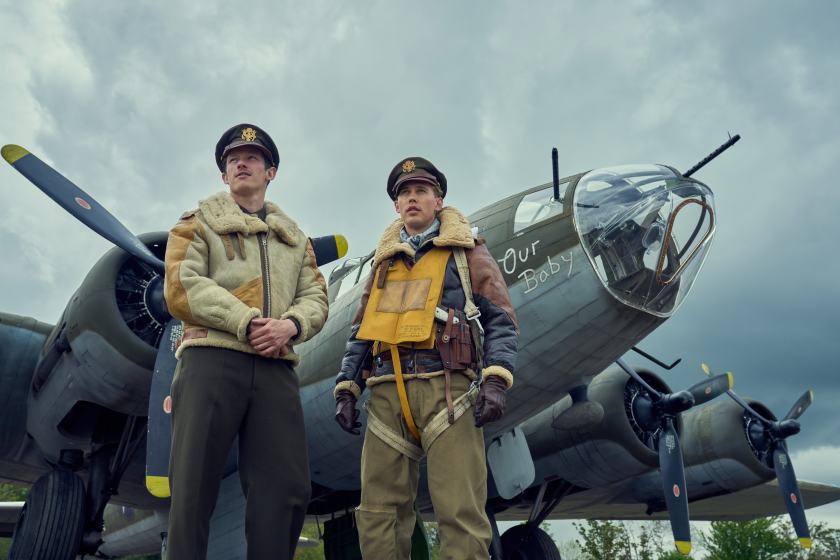
AppleTV+
When they're back on land, dozens of bodies fewer than when they went up, Egan wonders how he'll explain the loss to the rest of the men — the ones who haven't flown yet.
"Don't say anything," offers a jaded compatriot. "They'll figure it out."
This is the attitude carried by the men of the Bloody 100th, the real-life bomber squadron upon which "Masters" is based. With plenty of downtime between missions to sit at bars and drink and think, ruminating on what happened in the air wouldn't just be demoralizing to the untested newbies — it'd be impossible. How could one possibly explain such horrors to those who have never lived them? Perhaps this is the thematic undercurrent of every war movie — how the genre justifies its very existence: sometimes, words alone just aren't enough.
Cleven joins Egan a few weeks later. He's flying on a test mission with Roy Frank Claytor, played by Spielberg's son Sawyer (save your cries of nepotism here — the kid done good).
"Call this fort 'Alice from Dallas,'" Claytor suggests. Why? The gunner proudly passes up a photo of his woman back home — in it, she's flexing her swollen biceps.
"She'll give the fort a little extra muscle," comments one of the men.
"She looks... substantial," Cleven says.
What would a war movie be without some banter between the danger? And there's plenty of danger. "Masters" does an admirable job of conveying that even the test missions were a treacherous undertaking. This one, in particular, goes pear-shaped in a hurry. Unexpected winds throw the boat all out of whack. But Cleven demonstrates his mettle as a pilot and his natural-born leadership skills, setting her down safely.
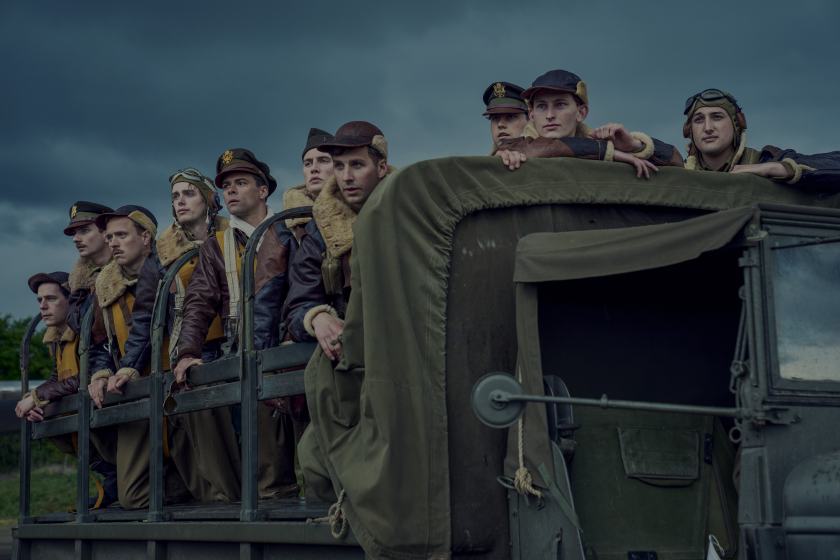
AppleTV+
The narrator declares he and Egan are the group's leaders. And Cleven's presence is especially like that of a rock star. Wide-eyed kids gaze at him in wonder as he climbs on board, thanking their lucky stars that they get to fly with the Major Gale Cleven. He saunters into the bar like a frontier hero entering a saloon in the Wild West, door clattering against the wall. Here, amidst the din of drinking and gambling, the narrator does his best to give us a rundown of the men in the 100th. It's too many people to keep track of — but as the first aerial battle has proven, the list will shrink with painful rapidity.
Next, we get the face of the narrator's voice: Major Crosby (Anthony Boyle), who wrote the biography "A Wing and a Prayer," which informed much of the series. Crosby asks Cleven where he's from. Fittingly, Cleven is from Wyoming, the cowboy state.
Crosby is the resident screw-up ripe for a redemptive arc. As a narrator looking back, he's wise and sure-footed. But here, he's nervous and jittery. His voice cracks like a 14-year-old's. As an onboard navigator, he gets a terrible bout of air sickness, sprays vomit all over the gunner, and leads their lost plane away from the group and straight toward Nazi-occupied France. They're almost blasted out of the sky before they realize what's happened and right course for England.
Crosby's story plays almost like a B-plot to the exploits of Cleven and Egan — at least in the first episode. With the narrator flying on a separate mission as the main characters, the story can feel disjointed. Of course, there wasn't much the writers could do. This is how things happened in the book, and one can take only so many liberties when adapting a biographical work. Nevertheless, the result is less cohesive and satisfying than when the whole squad rolls into battle together.
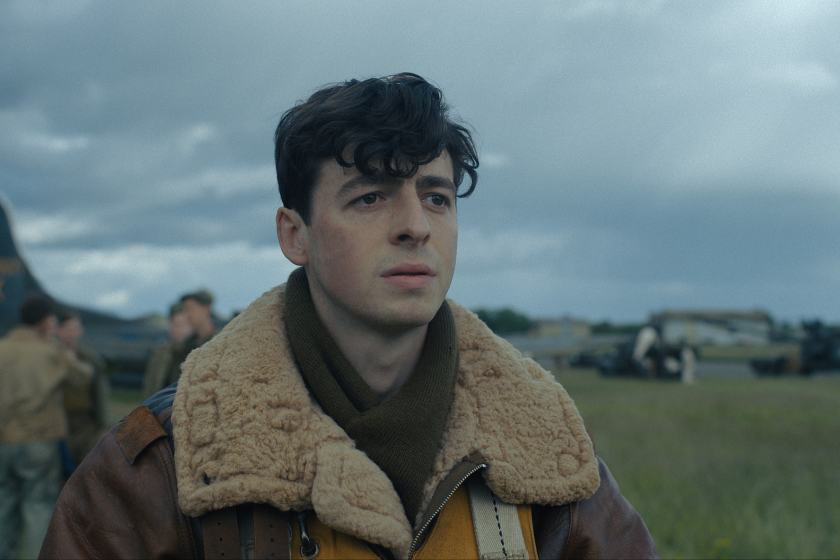
AppleTV+
This issue resolves itself by episode two when the hapless Crosby suddenly finds himself as a navigator for Cleven, which means Crosby is now the eyes of the whole squadron.
Despite vomiting all over the place yet again, he manages to steer them in the right direction for a successful bombing raid. He even saves the damaged boat piloted by Lt. Curtis Biddick (Barry Keoghan), pointing them toward a safe spot to land in Scotland.
As Biddick, the extremely Irish actor Keoghan completely buries his lilted accent under the high gliding vowels of a New Yorker. Biddick is a rough-and-tumble Brooklyn type, unafraid to throw hands with a British airman who had slighted him and his fellow Americans in a pub. (The Brits, who bombed the Germans by night, had been calling the Americans' daytime raids foolish and suicidal. Daytime raids were indeed far costlier, Crosby explains in a voiceover, but our superior instruments enabled for precise and targeted strikes. The Brits could only hit a general area, so had nothing to lose by flying under cover of darkness).
The show has some fun with Keoghan's Irishness when Biddick (who was of Irish descent) is taken in by Scottish civilians after the crash landing.
The Scotts don't like the English either, but "they like me because I'm Irish!" he tells Cleven and Egan over the phone in his thick New Yorker accent.
Another arc developed with Egan. When Cleven first shows up, Egan is relegated to a desk job, but he longs to return to the skies. Watching the men take flight and die in battle without him fills him with an unbearable survivor's guilt, exacerbated by his hard-drinking ways. One powerful moment sees him command Biddick to punch him just so he can feel something. By episode two, the Commanding Officer is sent home with a burst stomach ulcer, and the new CO demotes Egan so he can fly with his men once more.
The premiere closes with Bucky and Buck, brothers reunited through combat, in an air raid bunker, watching bombs explode like fireworks over the nighttime horizon. Cleven reveals his father was a drinker and a gambler — a loser at both — which is why he partakes in neither. He confesses that he agrees with the Brits — daytime raids are suicidal.
"What do we do?" Egan asks.
Butler's Cleven, channeling all that suave machismo that made him such a great Elvis, replies the only way a hotshot pilot could: "Lead our boys through it."
